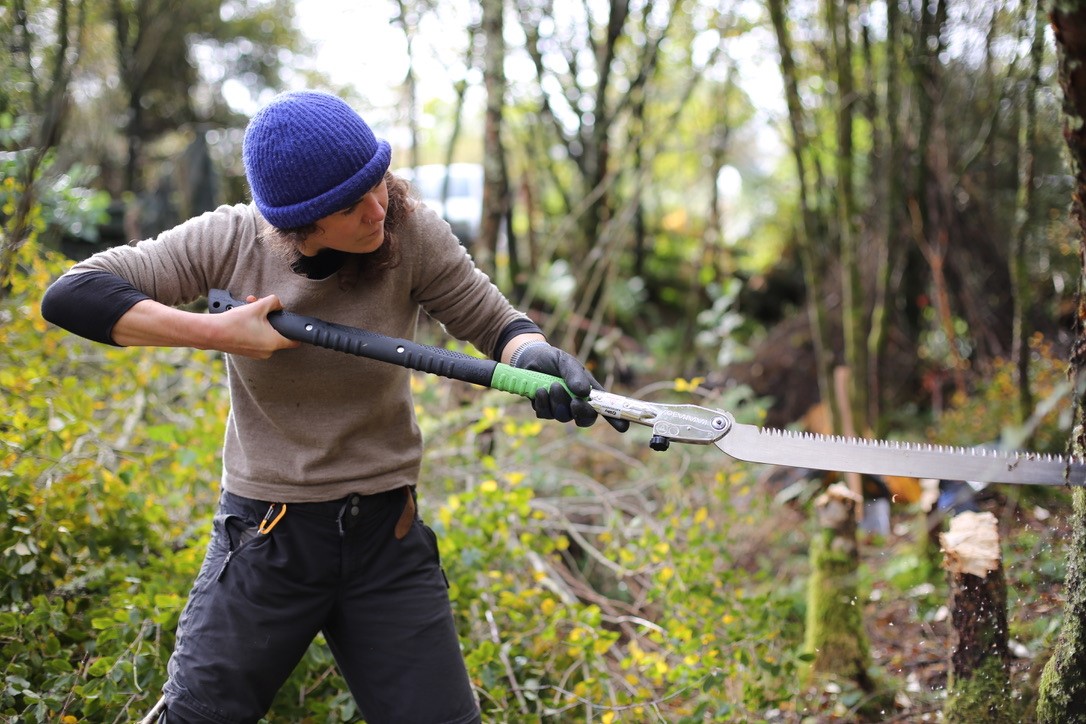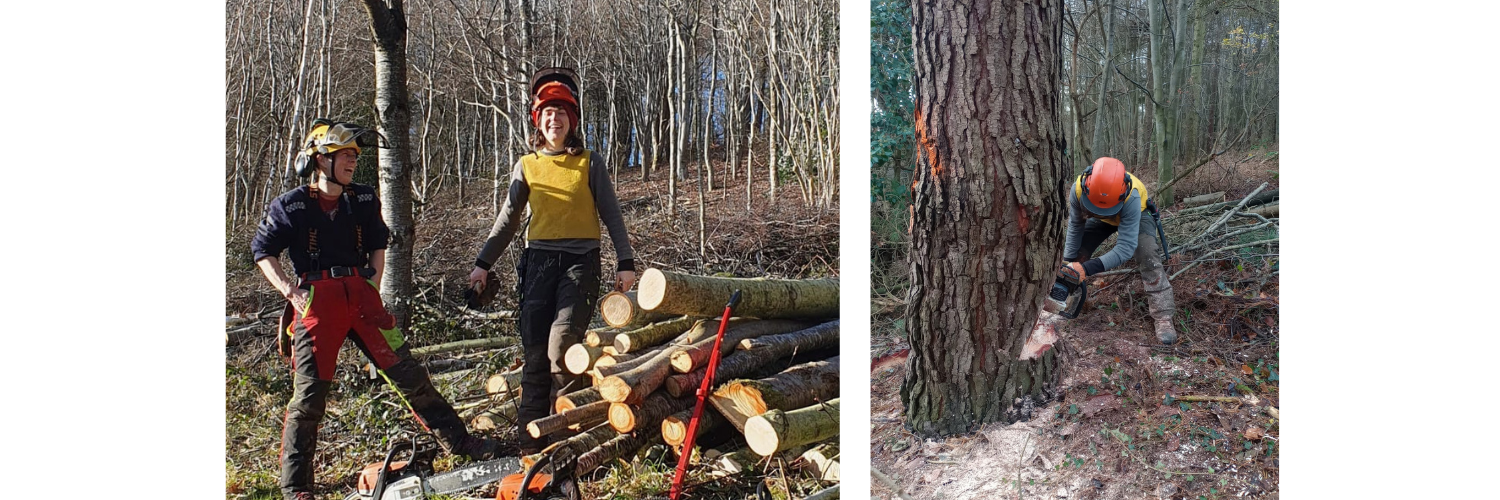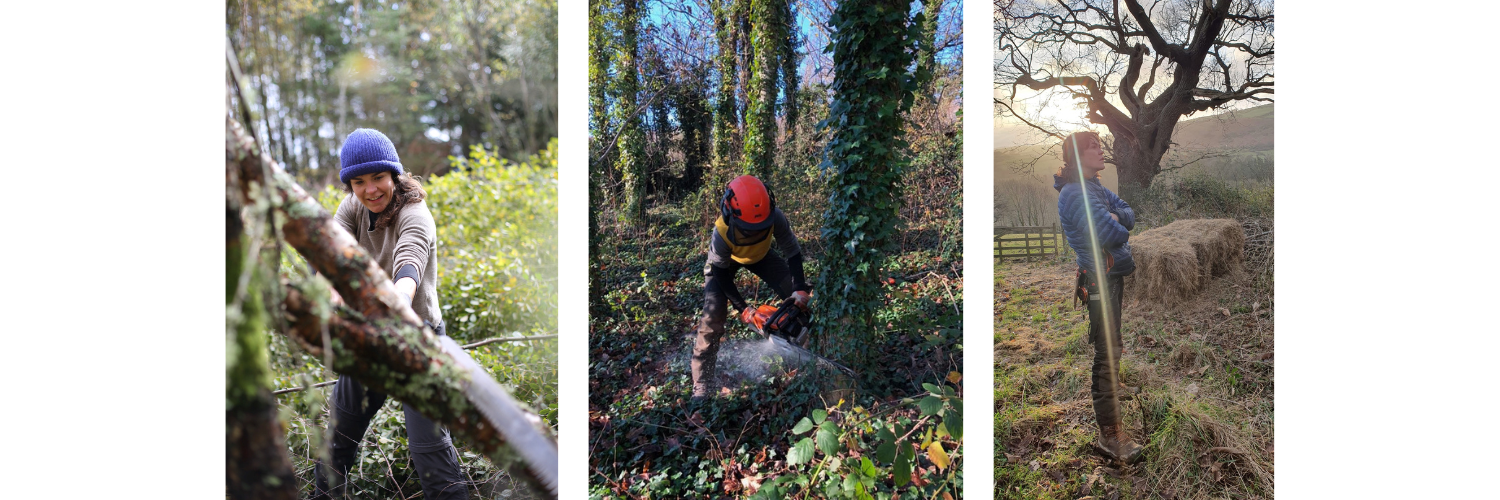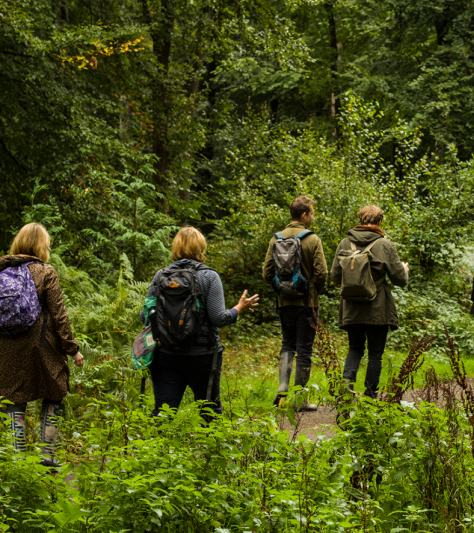Harriet Jenkins: “Women are capable and competent to do the work of a Forester”
The newest of our forestry cohort talking for International Women's Day, Harriet Jenkins is currently part of the Forestry Roots program based at Bron Haul in North Wales. She expands on her experience and inspiration so far.

1. What sparked your interest in forestry as a career path?
My personal connection to woodlands initially expressed itself as a love for camping. During an adventure to Morray, Scotland, I recall seeing trees being felled. It frustrated me that I didn’t know whether what I was seeing was positive or negative. At the time I wasn’t aware of how much this would influence my pursuit for learning about forestry in the coming years.
Having read about agroforestry, whilst volunteering at a market garden, I knew I wanted to learn more and begin practicing the principles of incorporating trees into agriculture. This led me to visit the Planterose family (founders of Reforesting Scotland) in the north west of Scotland. With their wealth of knowledge my intended stay of two weeks become one year: volunteering and working on various local projects that incorporated forestry practices. This quickly affirmed my decision to pursue forestry as a career path.
2. How have things changed for the better (or worse) regarding gender equality in forestry since you started?
I’m a new entrant into the industry so I feel that it’s difficult for me to comment on this however, in the last year that I’ve began my career I’ve been very aware of a gender imbalance. Despite this, I feel positive about the possibility of this changing with more funding opportunities being opened up to support women into the industry (such as Lantra’s Women in Forestry fund, in Scotland) as well as more women being represented through publicity, such as images in forestry articles and advertisement. These visual cues create role models for future female entrants and help normalise female foresters.
3. Which women have inspired or influenced you the most, and why?
Ruth Pybus has been a huge inspiration for me. She demonstrates an intelligent way of working that incorporates a complex knowledge of the natural landscape with refined technical skills and a great attention to safe working practice. Furthermore, her enthusiasm for introducing more women into the industry is enormous and has resulted in many women receiving in-depth tuition from her, including myself.
I’m currently doing a Woodland Practitioner apprenticeship at her (and David Brown’s) woodland in north Wales, as part of the RFS Forestry Roots scheme. As part of this placement Ruth has tutored me through many tasks and been extremely generous with her time and knowledge. Her patience and communication skills make her a fantastic teacher and most importantly, her passion for the subject is contagious: fuelling energy for the future of forestry, in which women will play an important role!

4. Do you have a favourite memory or standout moment from your time working in forestry that you would like to share?
I was on a job where a tree had become hung up. The winch we were using, in combination with the positioning of surrounding trees, made it challenging to resolve. With three of us working together to safety bring the tree down I directed the following operations which were successful – this felt like a proud moment given that I was in the company of two men!
5. What hurdles have you faced as a woman in the forestry field, and how did you navigate them?
I witnessed unsafe practice being demonstrated by a course leader during one of my training units which felt like an expression of machoism. I wasn’t comfortable speaking directly with the instructor about this however I reported my experience to the course providers. I think honest communication, where safe to do so, is extremely important and necessary. It’s important to reflect on moments that have made us feel uncomfortable and try to understand why. Once we’ve done this, we have a tangible issue that’s been identified and, through communication, can work on being resolved.
6. What kinds of support or changes would make the forestry profession more welcoming and empowering for women?
Sharing the message (verbally and visually) that women are capable and competent to do the work of a forester. The requirements and skill set for someone who works in forestry (not in an office job – but in the woods) is not dependent on having great physical strength but requires a plethora of knowledge and considered decision making. Working in the woods does require physical fitness but by working ‘smart’, instead of working ‘hard’ (i.e. using safe techniques for lifting and moving, instead of pushing our bodies beyond their abilities), we can work effectively to achieve the same results in a way that improves physical health, not at a detriment to it. The empowerment will come as a result.
7. Have you come across any stereotypes or misunderstandings about women in forestry, and how do you challenge those perceptions?
As a new entrant into the industry I feel that I’m still formulating an understanding of this however, I do perceive there being an expectation for female foresters to be more physically strong or able-bodied than most other women – I’d disagree and argue that the more important requirements for the job are based around safe and considered decision making.
I also suspect a common misunderstanding is that any woman working in forestry must feel very comfortable in a male dominated environment – In my experience, this isn’t true and I would challenge this perception by saying that most female foresters would love to see more of a gender balance in their working environment.

8. Are there any projects or achievements in your forestry career that you are especially proud of?
Ahead of doing my chainsaw courses in felling small, medium and windblown trees I felt nervous for my safety. As with learning any new skill, it can be intimidating before you understand it, and understanding it takes repeated practice before you gain a real sense of competence. Since receiving my certificates, I’ve gained lots of on-the-job experience felling trees. I now trust in my personal judgement and decision making abilities which make me feel safe at work.
9. What will be the biggest challenge for the generation of women behind you?
As more women enter the forestry industry I think they will be challenged with not conforming to social norms, in an industry that has, to date, been male dominated. It’ll be of importance for women to bring their authentic selves into the work place and feel confident that their opinions and judgements are of equal value to those of men.
10. What words of wisdom or encouragement would you offer to other women who are considering a career in forestry?
Curiosity will be your best tool. It leads to endless learning opportunities, self enquiry (understanding your personal boundaries and limitations) and also endorses communication with others too.
As a woman in forestry, I love my job and I’d highly encourage anybody that has an interest to explore it – more females in the industry will be a huge asset for future generations to come.
Many thanks to Harriet for sharing her experience so far in forestry, as well as those who continue to support her and others new to the forestry sector.
Read more:

